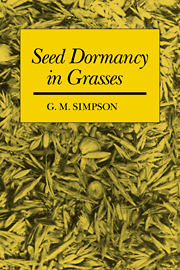Book contents
- Frontmatter
- Contents
- Preface
- Acknowledgements
- Introduction
- 1 The occurrence of dormancy in the Gramineae
- 2 Mutual influences of inflorescence and caryopsis parts on dormancy
- 3 Environmental influences on seed dormancy
- 4 Timing of dormancy
- 5 Modelling the induction, maintenance and termination of dormancy in grass seeds
- Bibliography
- Index
Preface
Published online by Cambridge University Press: 09 April 2010
- Frontmatter
- Contents
- Preface
- Acknowledgements
- Introduction
- 1 The occurrence of dormancy in the Gramineae
- 2 Mutual influences of inflorescence and caryopsis parts on dormancy
- 3 Environmental influences on seed dormancy
- 4 Timing of dormancy
- 5 Modelling the induction, maintenance and termination of dormancy in grass seeds
- Bibliography
- Index
Summary
A number of books have been published recently on the subject of germination physiology of seeds. They often have a chapter or two about seed dormancy, either to demonstrate the diversity of mechanisms among seed plants, or to try and simplify the complexity of dormancy mechanisms by establishing general models. A somewhat different approach is used here. Firstly, the subject is confined to seed dormancy in grasses. Secondly, experimental evidence is considered in depth for a single species, the wild oat (Avena fatua L.), probably the most widely studied species for understanding seed dormancy in the plant kingdom. The evidence for this member of the family Gramineae is compared with other examples among the Gramineae to reach some general conclusions about the nature of seed dormancy in grasses.
There are several reasons for confining the book to grasses. The grass family is one of the largest (25 tribes and 600 genera) and most diverse in the plant kingdom. From a human nutrition perspective it is the most important family. Grasses are the principal plant life form covering more than 70% of the land surface of the globe and they are of critical importance to the stability of the fragile arid and semi–arid zones. While seed dormancy is of great adaptive significance for survival in nearly all plant species with seeds, it is also the main reason why grass species cause the most serious weed problems in cultivated crops around the globe.
- Type
- Chapter
- Information
- Seed Dormancy in Grasses , pp. vii - viiiPublisher: Cambridge University PressPrint publication year: 1990

